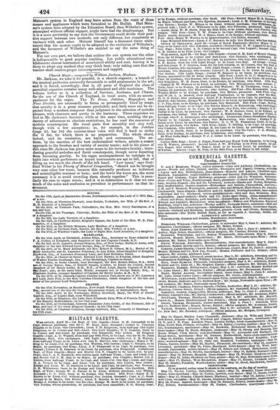Church Music ; composed by William Jackson, Meehan. Mr. Jackson,
we take it for granted, is a church-organist; a branch of the musical profession eminently favourable to solid attainments in the art; and it is found, accordingly, that in all parts of England the class of parochial organists contains many well-educated and able musicians. The volume before us is a collection of Services, Anthems, and Chants, for the use of the Church of England, in vocal score, with an accom- paniment for the organ. The 7'e Deum, Jubilate, Magnifteat, and Nune Dimittis, are necessarily in forms so peremptorily fixed by usage, that novelty is in a great measure precluded; and little more can be ex- pected from a modern composer than judgment in the selection of melodic phrases, with clearness and purity in the harmony. These requisites we find in Mr. Jackson's Services; while at the same time, avoiding the pe- dantry of adherence to obsolete restrictions, he has used the resources of modern counterpoint. His vocal parts flow smoothly and sing well, though with a few exceptions; as, for example, in the Jubilate (page 25, bar 10) the counter-tenor voice will find it hard to strike the G flat, for which there is no preparation. The whole chord, indeed, and its resolution, are harsh and extraneous. The an- them, by the sanction of the best ecclesiastical writers, admits a nearer approach to the freedom and variety of secular music; and in his pieces of this class Mr. Jackson has given more scope to his inventive faculty; intro- ducing graceful melodies and florid counterpoint, though never departing hem becoming gravity. In his organ accompaniment he indulges in a habit into which performers on keyed instruments are apt to fall, that of filling up too much the chords of the left hand. "Low tones," says Gott- fried Weber in his Theory of Musical Composition, "should not be brought very near other low tones, because this naturally produces an indistinct and unintelligible murmur or buzz; and the lower the tones are, the more necessary it is to avoid crowding them closely together." This is pecu- liarly the case in organ music; and it is to inattention to it that we owe much of the noise and confusion so prevalent in performances on that in- atrament.


























 Previous page
Previous page